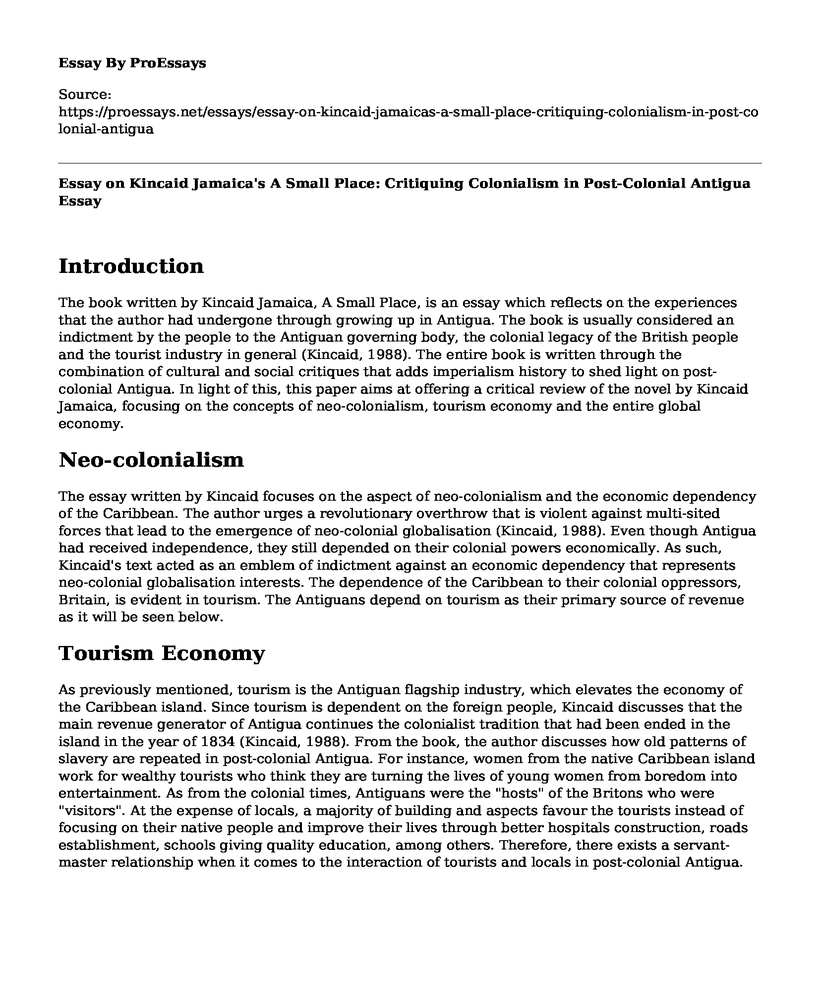Introduction
The book written by Kincaid Jamaica, A Small Place, is an essay which reflects on the experiences that the author had undergone through growing up in Antigua. The book is usually considered an indictment by the people to the Antiguan governing body, the colonial legacy of the British people and the tourist industry in general (Kincaid, 1988). The entire book is written through the combination of cultural and social critiques that adds imperialism history to shed light on post-colonial Antigua. In light of this, this paper aims at offering a critical review of the novel by Kincaid Jamaica, focusing on the concepts of neo-colonialism, tourism economy and the entire global economy.
Neo-colonialism
The essay written by Kincaid focuses on the aspect of neo-colonialism and the economic dependency of the Caribbean. The author urges a revolutionary overthrow that is violent against multi-sited forces that lead to the emergence of neo-colonial globalisation (Kincaid, 1988). Even though Antigua had received independence, they still depended on their colonial powers economically. As such, Kincaid's text acted as an emblem of indictment against an economic dependency that represents neo-colonial globalisation interests. The dependence of the Caribbean to their colonial oppressors, Britain, is evident in tourism. The Antiguans depend on tourism as their primary source of revenue as it will be seen below.
Tourism Economy
As previously mentioned, tourism is the Antiguan flagship industry, which elevates the economy of the Caribbean island. Since tourism is dependent on the foreign people, Kincaid discusses that the main revenue generator of Antigua continues the colonialist tradition that had been ended in the island in the year of 1834 (Kincaid, 1988). From the book, the author discusses how old patterns of slavery are repeated in post-colonial Antigua. For instance, women from the native Caribbean island work for wealthy tourists who think they are turning the lives of young women from boredom into entertainment. As from the colonial times, Antiguans were the "hosts" of the Britons who were "visitors". At the expense of locals, a majority of building and aspects favour the tourists instead of focusing on their native people and improve their lives through better hospitals construction, roads establishment, schools giving quality education, among others. Therefore, there exists a servant- master relationship when it comes to the interaction of tourists and locals in post-colonial Antigua.
Global Economy
From the Antiguan economy even after colonialism, it is evident that it was stunted in growth and depended heavily on tourism from the outside world, which still holds them as their colony. The latter shows the dependency that a majority of countries had on their colonial powers back in the 1980s. However, several modernised institutions such as the International Monetary Fund through the Washington Consensus proposed structural reforms which were responsible for increasing independence of markets in Antigua and such as developing economies (Agarwal, 2020). In addition, the autonomy of markets provided by the Washington Consensus reduced the dependence that foreign countries have on their colonial oppressors. The local aspects of any developing country should not be directed to making the life of foreigners better but rather should improve the lives of local people.
Conclusion
It is indeed true of how slavery still runs even today. Locally, many structures are built with fervent extravagance to entertain tourist while there is no ample medical equipment, schools, or even rehabilitation centres aimed at helping the community at large. Furthermore, my perspective of tourism has changed significantly as tourists make countries invest heavily in the industry while ignoring the needs that need to be improved to make the quality of life of locals' kind. Countries should first better the lives of their citizens before making substantial investments to please foreigners.
References
Agarwal, P. (2020, February 10). Washington Consensus. Retrieved from https://www.intelligenteconomist.com/washington-consensus/
Kincaid, J. (1988). A small place. New York: Farrar, Straus, Giroux.
Cite this page
Essay on Kincaid Jamaica's A Small Place: Critiquing Colonialism in Post-Colonial Antigua. (2023, May 08). Retrieved from https://proessays.net/essays/essay-on-kincaid-jamaicas-a-small-place-critiquing-colonialism-in-post-colonial-antigua
If you are the original author of this essay and no longer wish to have it published on the ProEssays website, please click below to request its removal:
- Healing Healthcare Staffing Shortage Essay
- Literary Analysis Essay on Twain Adventures of Huckleberry Finn: Huck Finn and Jim's Relationship
- Paralysis in Dubliners and the Contributing Factors Essay Example
- Biographical Criticism of John Donne Essay Example
- Essay Example on Life: Contrasting Perspectives in An Arundel Tomb & Ozymandias
- Essay Example on American Literature: Reflecting and Shaping Communities
- Recruiting and Selecting Qualified Candidates: Best Practices in the Digital Era







